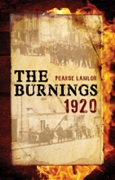
It is common knowledge that Belfast was riven by sectarian rioting and murder in the early 1920s during the War of Independence.
However, smaller towns in the north, particularly in Co Down, were also the scene of pogroms and assassination.
Now, almost 90 years later, Co Down grandfather Pearse Lawlor has penned the first published account of the events of July to September 1920 in which more than 1,000 Catholic families lost their homes in the county.
Described as a story of “murder, revenge and reprisal”, the book has just arrived in bookshops.
The story begins on July 17 1920 when Colonel Gerard Brice Ferguson Smyth was shot dead.
He had recently joined the Royal Irish Constabulary (RIC) after a career in the British Army.
The colonel was enjoying himself at a gentleman’s club after having delivered a heated speech to his fellow RIC men in a police barracks in County Kerry.
In a hard-hitting address he told fellow officers to shoot Republican volunteers if they ignored orders to set down their weapons.
And, should a police barracks be targeted, to go out and find the first Catholic home, force out the occupants and take it over to be used as the new station.
Originally from Banbridge in County Down, Colonel Smyth was considered a first-class soldier, having served in the First World War.
His murder sparked trouble on the streets of his home town, where loyalists took to the streets incensed by the killing.
When railway workers in Cork refused to carry Col Smyth’s body back to the north so he could be buried in his home town, widespread acts of retaliation began in earnest against Catholics and the trouble soon spread to Dromore and Lisburn.
During the next three days and nights, hundreds of Catholic-owned shops and homes were burned and businesses and pubs were looted. As a result, countless Catholic families were forced to leave the area.
As the trouble raged on, the British government enlisted the help of a policeman, Detective Inspector Oswald Ross Swanzy, in the hope that he could bring the mayhem under control.
The well known RIC man had been spirited away to the north from Cork some months earlier after he was named as being among those responsible for the death of Sinn Fein lord mayor Thomas Mac Curtain in March 1920.
The killing is considered a key event in the War of Independence, in which the IRA and British army irregulars the ‘Black and Tans’ fought a guerrilla war.
The 36-year-old Mac Curtain, who had been in office three months when was murdered, was shot in front of his wife by a gang of men with blackened faces who were later seen entering the local police barracks.
An official inquest into the killing found that those responsible were members of the RIC and a verdict of wilful murder was passed against British prime minister Lloyd George. However, no-one was ever convicted.
Detective Inspector Swanzy found himself responsible for restoring order to the streets of Co Down in July 1920.
However, his attempts were short lived as the IRA now considered him a marked man.
After two failed attempts, the Republican group eventually killed him as he emerged from church in Lisburn on August 22 1920.
It was said that Mac Curtain’s personal handgun was used to carry out the killing.
More than 1,000 Catholic families lost their homes during the trouble, which raged from July until September of that year.
Pearse Lawlor has now penned The Burnings 1920, having researched the events for more than a year.
He admits the issue is still considered sensitive in the Lisburn area.
However, he wants to make it clear that many unionists shielded their Catholic neighbours, with some even arming themselves against the mobs.
“It’s a story about murder, revenge and reprisals,” Mr Lawlor said.
“It sounds like a story of fiction. It’s the first time the story has been told.
“At one stage only seven Catholics turned up for Mass on a Sunday in Lisburn because so many were forced to leave.
“I carried out my research all over Ireland. I went through nationalist and unionist newspapers and went to the Public Records Office in Belfast and in Dublin and the National Library and University College Dublin.”
* The Burnings 1920 is available from the Republican Bookshop priced 12.50 Euros.
![[Irish Republican News]](https://republican-news.org/graphics/title_gifs/rn.gif)
![[Irish Republican News]](https://republican-news.org/graphics/title_gifs/harp.gif)

